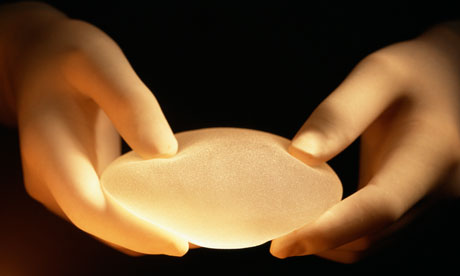
To read some of our tabloid newspapers – which are not adverse to showing the odd bare breast – you might be seduced into thinking that the still-unfolding scandal of faulty breast implants made by the French firm Poly Implant Prothese (PIP) was just about vain women seeking Barbie Doll-style boob jobs. Serve them right if their treatment at dodgy cosmetic clinics all goes horribly wrong. Why should the NHS have to pay for them to have faulty implants removed?
So much for sisterhood. Or indeed for the many women, including me, who have had breast reconstruction using implants after surgery to treat breast cancer.
Four years ago – in the blurry haze following my diagnosis – I had to make a swift decision about whether to have a breast reconstruction at the same time as my mastectomy. I decided to go ahead and was told that, because of my slim build, my only option was a procedure involving a silicone implant. The last thing on my mind as I was led down to the operating theatre was to check which company had made the implant, let alone in which country.
When the scare about the PIP implants erupted just before Christmas, I was one of the lucky ones: I already knew that the alien beast nestling under my pectoral major muscle is not made by PIP. My knowledge had nothing to do with any incisive questioning on my part, but because my consultant sent me all the details in a letter prior to my operation.
But many other women who have been treated for breast cancer and fitted with PIP implants before the 2010 ban on their use in the UK may not have had such reassurances. Indeed, treatment solely on the NHS rarely comes with such information.
Of the suspected implants fitted into more than 40,000 UK patients in 2000-2010, the Department of Health says that 2,000 to 3,000 were provided by the NHS – 5-7% of the total – which by implication means they were for breast reconstruction, as the NHS does not perform cosmetic sugery.
Some commentators have conveniently used this to emphasise that the overwhelming majority of implant operations in the UK involve cosmetic procedures entered into voluntarily and privately. So does that mean that the minority do not count? Or indeed that any of these women are less deserving of concern?
Emma Pennery, clinical director of the Breast Cancer Care charity (BCC), says she believes the impact of the scandal for women with breast cancer has been buried as a result of the media using it as a stick with which to beat women opting for aesthetic enhancement. "If there are 2,000 to 3,000 women affected in the UK then that is not an insignificant number. These are women who will have to make decisions about having their implants removed. And it's more complicated than in a case of cosmetic surgery when women would still have their original breast as well as the implant – allowing an 'envelope' in which to place the replacement implant. After a mastectomy there may be little – or even no – tissue, which can be more restrictive for the surgeon."
Another issue is whether the French scandal could undermine women's confidence in implants generally. Around 50,000 women in the UK are diagnosed with breast cancer every year. The most recent All Breast Cancer Report, using data from 2007, reported that 43% of women diagnosed had surgery to remove their breasts – with 11% opting for immediate reconstruction – while a national audit for the Royal College of Surgeons put the latter figure higher at 21%. Medical evidence suggests that women faced with the trauma of losing a breast will cope better if they have a reconstructed one. An alternative to implants is to use skin, fat and sometimes muscle – taken from another part of the body – to make a new breast, but this type of operation is longer and more complex than using an implant.
Today, an expert advisory group headed by Professor Sir Bruce Keogh, the NHS's medical director, is due to publish its findings on how the UK authorities can avert a similar scandal in the future. It is expected to recommend a new register to ensure that reliable and consistent data is logged by all private clinics and providers. Unless pressure builds for change and the women who are the victims of misconduct stop being seen as in the wrong, this new register will not be enough.

